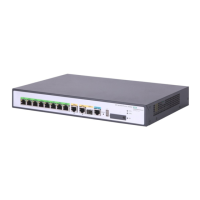429
rsa_rc4_128_md5: Specifies the key exchange algorithm RSA, the data encryption algorithm 128-bit
RC4, and the MAC algorithm MD5.
rsa_rc4_128_sha: Specifies the key exchange algorithm RSA, the data encryption algorithm 128-bit RC4,
and the MAC algorithm SHA.
Usage guidelines
SSL employs the following algorithms:
• Data encryption algorithms—Encrypt data to ensure privacy. Commonly used data encryption
algorithms are usually symmetric key algorithms, such as DES_CBC, 3DES_EDE_CBC, AES_CBC,
and RC4. When using a symmetric key algorithm, the SSL server and the SSL client must use the
same key.
• Message Authentication Code (MAC) algorithms—Calculate the MAC value for data to ensure
integrity. Commonly used MAC algorithms include MD5 and SHA. When using a MAC algorithm,
the SSL server and the SSL client must use the same key.
• Key exchange algorithms—Implement secure exchange of the keys used by the symmetric key
algorithm and the MAC algorithm. Commonly used key exchange algorithms are asymmetric key
algorithms, such as RSA.
The SSL client sends the preferred cipher suite to the SSL server, the server matches the received cipher
suite against the cipher suits it supports. If a match is found, the cipher suite negotiation succeeds.
Otherwise, the negotiation fails.
If you execute this command multiple times, the most recent configuration takes effect.
Examples
# Configure the SSL client policy policy1 to support the key exchange algorithm RSA, data encryption
algorithm 128-bit AES_CBC, and MAC algorithm SHA.
<Sysname> system-view
[Sysname] ssl client-policy policy1
[Sysname-ssl-client-policy-policy1] prefer-cipher rsa_aes_128_cbc_sha
Related commands
• ciphersuite
• display ssl client-policy
server-verify enable
Use server-verify enable to enable the SSL client to use digital certificates to authenticate SSL servers.
Use undo server-verify enable to disable authentication. That is, the client does not authenticate any
server.
Syntax
server-verify enable
undo server-verify enable
Default
The SSL client uses digital certificates to authenticate SSL servers.
Views
SSL client policy view

